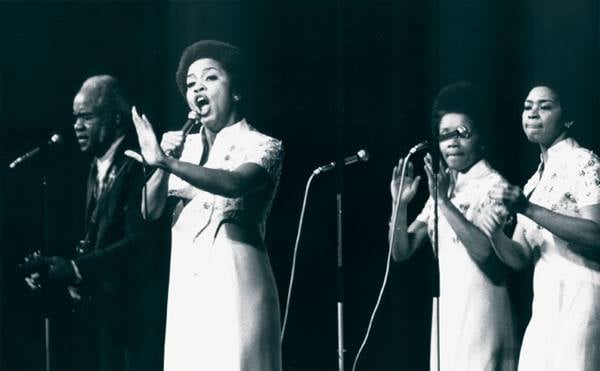December 19, 2000 Pops Staples died after suffering a concussion in a fall at his home
A pivotal figure in gospel in the 1960s and 70s, Staples was the patriarch and member of singing group The Staple Singers, which included his son Pervis and daughters Mavis, Yvonne, and Cleotha.
Staples was born on a cotton plantation as the youngest of 14 children and left school in the 8th grade to pick cotton. When growing up he heard, and began to play with, local blues guitarists such as Charlie Patton (who lived on the nearby Dockery Plantation), Robert Johnson, and Son House. He picked up his early musical education in the church, and he sang with a gospel group, the Golden Trumpets, but also indulged a love of the secular sound of the blues (he cited Bessie Smith and Blind Lemon Jefferson as among his favorites), and played locally as a solo blues singer and guitarist at dances and picnics.
He moved north to Chicago in 1936, with his wife, Oceola Staples, and their young family. He joined another gospel group in the city, the Trumpet Jubilees while working in the stockyards, and encouraged his children to sing at home. In 1947 the family began to sing in church as The Staple Singers, with Pops and Oceola joined by their son, Pervis, and two of their daughters, Cleotha and Mavis, who was only 7 years old at the time, and sang bass in the group, but later became its lead singer.

They continued to build a reputation in Chicago, and first recorded in the early 1950s for United although the group resisted the record company’s demands that they record non-gospel material, and then with the larger Vee-Jay Records, with songs including 1955’s “This May Be the Last Time” (later covered by The Rolling Stones as “The Last Time”) and “Uncloudy Day”, their first hit, which Pops Staples later observed “sold like rock and roll” without compromising their spiritual or religious convictions.
It sparked a series of successful singles in the late 50s, including versions of “Stand By Me” (later made famous by Ben E. King) and “This Could Be The Last Time”, covered by The Rolling Stones, albeit with different lyrics. They recorded a number of albums for the jazz label Riverside in the early-60s, and signed to Epic Records, a major pop label, in 1967.
In the 1960s the Staple Singers moved to Riverside Records and later Stax Records, and began recording protest, inspirational and contemporary music, reflecting the civil rights and anti-war movements of the time. They gained a large new audience with “Respect Yourself” (which featured Pops, nearly 57 at the time, on lead on the long version for more than two minutes), the 1972 US # 1 hit “I’ll Take You There”, “If You’re Ready (Come Go With Me)”, and other hits. “Let’s Do It Again” topped the Hot 100 on December 27, 1975, the day before his 61st birthday. Pops Staples also recorded a blues album, Jammed Together, with fellow guitarists Albert King and Steve Cropper.
In 1976, Staples also appeared in the movie documenting The Band’s final concert, “The Last Waltz” (released in 1978). Pops Staples shared vocals with his daughters and with Levon Helm and Rick Danko on “The Weight.” The group appeared in the concert on stage, but their later performance shot on a soundstage was used in the final film. It is considered by some fans as the definitive version of the song.
After Mavis left for a solo career in the 1980s, Pops Staples began a solo career, appearing at international “blues” festivals (though steadfastly refusing to sing the blues), and tried his hand at acting. His 1992 album Peace to the Neighborhood won a Grammy nomination, and in 1995 he won a Best Contemporary Blues Album Grammy for Father, Father.
In 1986, Roebuck played the role of Mr. Tucker, a voodoo witch doctor, in the Talking Heads film True Stories, during which he performed “Papa Legba”. He appeared as himself in the 1997 Barry Levinson film Wag the Dog, singing “Good Old Shoe” with Willie Nelson.
In 1998 he received a National Heritage Fellowship from the National Endowment for the Arts, and in 1999 the Staple Singers were inducted into the Rock and Roll Hall of Fame. After his death, his daughters Yvonne and Mavis gave one of his guitars to country and gospel musician Marty Stuart.READ MORE:
http://www.popsstaples.com
http://www.npr.org/artists/383503449/pops-staples
http://www.britannica.com/biography/Roebuck-Staples
https://rockhall.com/inductees/the-staple-singers/bio/
http://www.mtv.com/artists/roebuck-pops-staples/biography/
http://mswritersandmusicians.com/musicians/staples.html
http://www.msbluestrail.org/blues-trail-markers/pops-staples
http://www.jazzhouse.org/gone/lastpost2.php3?edit=977305674
|https://en.wikipedia.org/wiki/Pops_Staples
